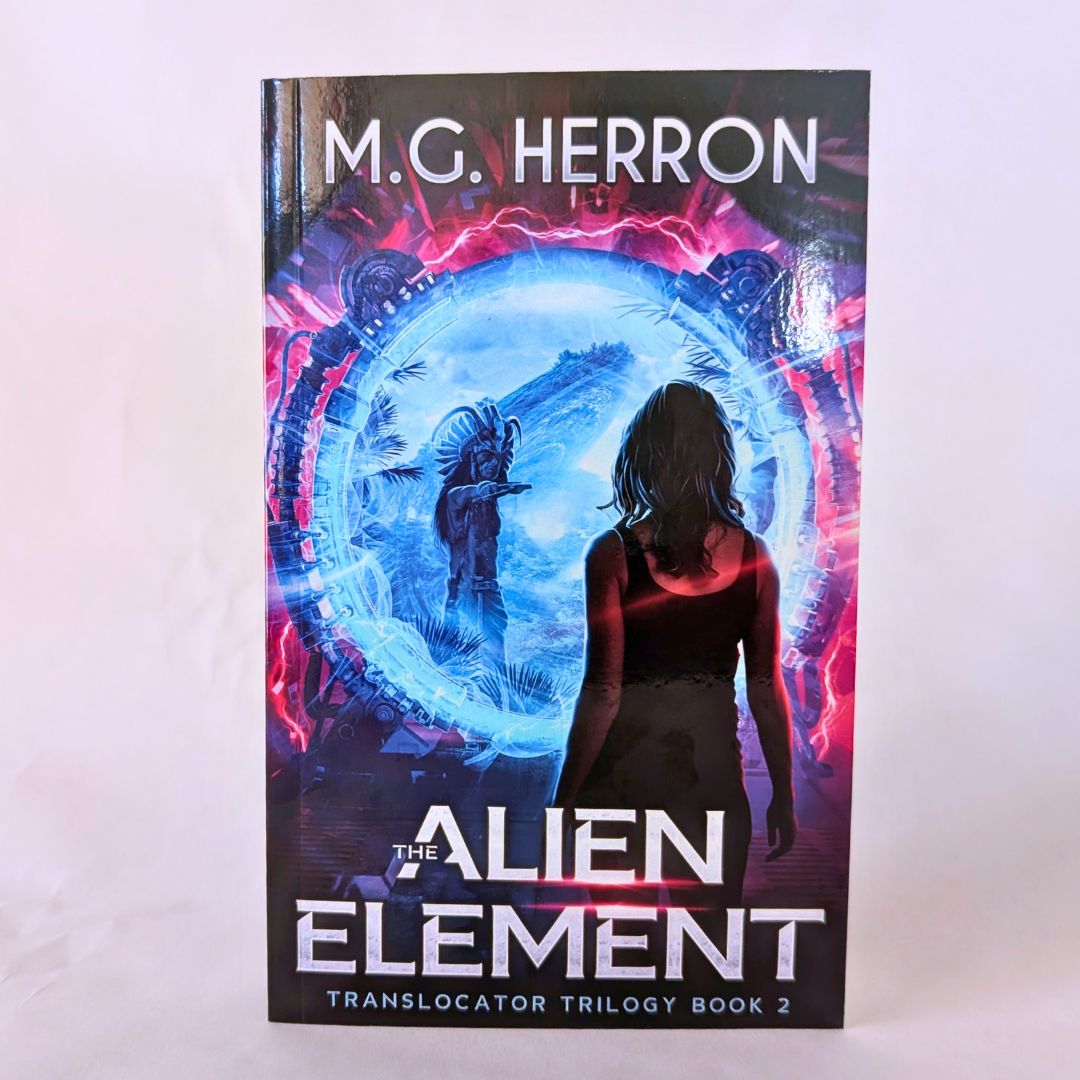Book 2: The Alien Element (Paperback)
Book 2: The Alien Element (Paperback)
- 5”x8” glossy paperback
- Printed in the USA, UK, AUS and CA
- Worldwide shipping
Couldn't load pickup availability
100% Money Back Guarantee
Drawn by an ancient mystery
The question of how a tribe of ancient Mayans ended up living on a distant planet continues to haunt archaeologist Eliana Fisk, but Amon won’t let her anywhere near the Translocator after what happened last time.
Since a return journey is impossible, she does what archaeologists were born to do, and searches for clues among Mayan ruins on Earth.
What she discovers in the jungle will reveal a mystery far older than she thought possible, with roots winding back through through the centuries…and eventually lead her to an primeval well of power that threatens the safety of both worlds.
The Alien Element is a fast-paced science fiction thriller with an edge of the fantastic—a treacherous quest for answers that becomes a harrowing battle against an ancient adversary beyond imagining.
Read an excerpt
Read an excerpt
Rakulo trudged through the ancient forest with low spirits and limbs so tired and heavy it seemed a miracle that his feet continued to obey his commands. He walked on through the grey, sunless day, clenching his teeth each time the cold, biting wind sliced down through the trees to prickle his sweat-soaked skin.
He held his head high despite his exhaustion. Thirty young warriors trailed in a ragged line behind him, their clumsy footsteps occasionally catching on concealed tree roots or vines buried among the deep leaf-covered forest floor.
Even though Rakulo felt as tired as they did, he couldn’t let them see any signs of weakness. A good leader never showed weakness, no matter how used up he felt.
About an hour outside the village, Rakulo held an open hand up, signaling to the warriors following him that it was time to stop and rest. Most of the weary men and women sank wordlessly to the ground with their backs against the nearest tree, not even bothering to seek out the most comfortable spot. When you’re that exhausted, anything that supports your weight feels like the softest feather bed.
“We’ll be home soon,” Rakulo said. “You’ll have two days with your families before we set out again, so make good use of the time. And it goes without saying, but not a word, not even among family, about what we were doing at the Wall.”
They nodded, but none spoke, for no one had the energy. A few heads lolled back to rest against moss-covered trunks. One or two warriors took deep breaths and blew out their cheeks as they sighed.
Citlali stood from where she had been squatting and walked over to Rakulo. Of all his warriors, Citlali was among the fiercest. Where some of the younger men were still scrawny, lean cords of muscle stood out beneath Citlali’s tawny skin. Where others tired after half a day of hard walking, Citlali could run from one end of the Wall to the other in a single day, and have energy to spare. Even now, the only sign of her fatigue was the quick rise of her chest while she breathed, and her puffy eyelids, which betrayed a lack of sleep.
She leaned close to him and spoke in a low voice so the others wouldn’t overhear their conversation.
“Don’t you think you’re pushing them too hard?” Citlali asked. “We’ve been in the forest for a score of days now.”
“They need to be in fighting shape,” Rakulo said.
“They also need time to recover,” she said. “And time to spend with their children. You’re too hard on them. They need strengthening, not breaking.”
“No one knows what dangers wait for us beyond the Wall. They need to be ready—for anything.”
She bobbed her head from side to side considering this. Rakulo said nothing about the fruitless journey from which they were now returning. They had searched along the Wall for days and days, looking for a way around or through, and found nothing. She finally nodded, turned, and sauntered casually back to where she had been resting a moment ago, making sure not to let her agitation show in her movement or on her face.
Citlali might disagree with Rakulo’s methods, but even if she was opposed to him, she would be careful not show any sign of open dissent. Rakulo was their chief now and had been for twelve cycles of the two moons.
Rakulo turned his back on the group of weary warriors and gazed off into the distance, where he knew the stone city called Uchben Na—Ancient Mother—stood empty in the jungle. His ancestors had lived there once, but not for many generations. For as long as anyone could remember, and long before that, his people had lived in Kakul, the village on the edge of the sea.
Citlali was right, of course. He was too hard on them. But he had to be. There was no other option.
They hadn’t found a way through the Wall this time, but one day they would. He needed them all to be ready when that happened, when the day came to fight for their freedom. Rakulo directed them to prepare in other ways. Together, they had learned to carve canoes from sturdy tree trunks. Together, they made flint-tipped arrows, and knives of obsidian, and spears with tips of obsidian and flint. All of it was training and preparation. All of it was to ready them for the future and whatever may lie ahead.
When his warriors had caught their breath, Rakulo motioned them to their feet and moved onward, setting a slightly slower pace this time. They skirted around Uchben Na, crossed the river, and soon were padding into the farmland around the village, past the rows of corn and beans, toward the thatched-roofed huts that made up the village.
Men and women came out of the field and village to greet them. As soon as word spread about their return, more people emerged from between the mud daub walls. Children cried out happily, weaving between their parents’ legs on bare feet.
Rakulo exchanged polite greetings, and smiled as his warriors were reunited with their families and led home by their husbands, wives, brothers, and mothers. The children ran circles around them, whooping and laughing. Rakulo breathed deeply of the tangy sea-smelling air, carried to him by another cool breeze. Despite his discontent at a year of searching and no results, it sure felt good to be home, especially now while the weather seemed to be giving them a reprieve.
A plump figure draped with seashell necklaces, her shoulders thick with tattoos that showed her seniority and elevated social status, turned a corner. Spotting Rakulo, Ixchel walked quickly toward him. He could tell by her posture that something was bothering his mother.
“Chief Rakulo,” Ixchel said, loud enough for those still lingering nearby to hear. “I’m glad to see you’ve returned home safely again, my son.”
Rakulo hugged her close to him and whispered, “Is everything okay, mother?”
“We must speak in private,” she replied softly.
He followed her back to the house they shared near the center of the village. It was one of the oldest homes, with a fired clay foundation, sturdy wooden walls, and a thick roof that kept the house dry during even the fiercest monsoons. As chief, Rakulo could have commandeered a new house for himself, but he wasn’t home that often and didn’t want to isolate his mother, who had lost her husband and her youngest son in quick succession last year. Although there was no door to close the hut—all the houses in the village were open to the air—once inside, they had some privacy and could speak more openly.
“Did something happen while I was gone?” Rakulo asked.
“Ekel, the fisherman, has gone missing,” Ixchel said without preamble.
“What?” Rakulo swore, his hands clenching into hard fists. “When? Who else knows?”
“Word has certainly spread by now, although no one is talking about it where they can be heard.”
So that explained the obvious relief on the faces of his warriors’ families when they came to greet their loved ones. It was no shock that no one was talking about it. Everyone knew what it meant when an old man or woman went missing.
“Could he have just gone off on his own for a while? Down the coast, or into the forest? Has anyone checked the caves?”
Ixchel gave him a condescending look. “Old Ekel, the homebody? The man who’s gone fishing in the same spot every day for the last ten years?” She shook her head firmly. “No.”
Strange, indeed, Rakulo thought.
It had been over a year since Xucha had shown his face—the God had been absent since the death of Chief Dambu, Rakulo’s father. Had Xucha taken Ekel in retribution for what he’d done? And if so, why had it taken so long?
In direct contravention to tradition, Rakulo’s first order when he became chief was to immediately cease the human sacrifices that Xucha had demanded, and which had been reinforced by Chief Dambu and the endless line of shamans and chiefs that came before him—often unwillingly. Chief Dambu had been punished for his resistance, and eventually offered as a sacrifice himself.
When Rakulo became chief, he decreed that Chief Dambu was to be the last sacrifice.
The next few cycles of the moons were tense as everyone braced for retaliation from their God. None came. Xucha stayed away, no one fell ill, and eventually people began to relax. Many new babies were born in the last year, and—this was unprecedented—one elderly woman even died a perfectly natural death in her sleep. Rakulo had her buried next to the grave of Ixchel’s youngest son, Rakulo’s little brother, Tilak, who had been struck ill by Xucha in punishment for Dambu’s disobedience.
Since Rakulo took over as chief and refused to continue the tradition of sacrifice, their village had experienced a year-long peace.
Until now. Until Ekel’s disappearance. He knew what people would think. The whole situation stank of Xucha’s influence. The black-clad God was known to be deceptive, to work in secret and under cover of night.
Or was there another explanation?
“Why Ekel?” Rakulo asked. “Why now?”
“He stopped fishing while you were gone because the journey to the beach had become too hard on his knees. At least, that’s what he told everyone.” She was silent for a moment, considering the source of the information. “Your father would have said he was the sensible choice.”
“There are other things Ekel can do! And father’s not with us anymore. I’m Chief now.”
“I know that.” His mother scowled at him, and for a moment he felt like a child again—and doubly guilty for reminding his mother that her husband was gone. “Why do you think I’m telling you these things? But there’s something else.”
Rakulo took a deep breath. “What is it?”
“I think Maatiaak had something to do with it.”
“Elder Maatiaak?”
“The two of them barely spoke to each other before a few days ago.”
Rakulo nodded. “They both wanted to marry Dea, Citlali’s mother, and have been rivals ever since. But why does that matter?”
“They were never kind to each other. But after you departed a few weeks ago, that changed. Maatiaak began spending a lot of time with Ekel. They suddenly acted like old friends. I thought it was odd, but paid it no mind at first. I was happy to see that they had finally found common ground after all these years.” She pursed her lips and paused.
Rakulo finished her thought for her. “And then Ekel disappeared,” he said. “All of a sudden.”
“Something’s wrong, Rakulo. I can feel it.”
A dread twisted his stomach. She was right. Something was very wrong.
“I better pay Citlali’s father a visit.”


Books in this series
More from The Translocator Trilogy
-
Book 1: The Auriga Project (Paperback)
Regular price $14.99Regular priceUnit price / per$19.99Sale price $14.99Sale -
Book 2: The Alien Element (Paperback)
Regular price $16.99Regular priceUnit price / per$24.99Sale price $16.99Sale -
Book 3: The Ares Initiative (Paperback)
Regular price $16.99Regular priceUnit price / per
Shop the best deals
Save up to 65% on exclusive book bundles!
-
Relics of the Ancients: Exclusive Audiobook Bundle
Regular price $23.99Regular priceUnit price / per$85.94Sale price $23.99Sale -
Relics of the Ancients: Exclusive E-book Bundle
Regular price $15.99Regular priceUnit price / per$38.94Sale price $15.99Sale -
Relics of the Ancients: Exclusive Paperback Bundle
Regular price $53.99Regular priceUnit price / per$99.96Sale price $53.99Sale -
Relics of the Ancients: Exclusive Signed Hardback Bundle
Regular price $89.99Regular priceUnit price / per$179.96Sale price $89.99Sale -
The Gunn Files: Exclusive E-book Bundle
Regular price $15.99Regular priceUnit price / per$31.96Sale price $15.99Sale -
The Gunn Files: Exclusive Paperback Bundle
Regular price $53.99Regular priceUnit price / per$99.96Sale price $53.99Sale -
The Gunn Files: Exclusive Signed Hardback Bundle
Regular price $89.99Regular priceUnit price / per$179.96Sale price $89.99Sale -
The Translocator Trilogy: Exclusive E-book Bundle
Regular price $13.99Regular priceUnit price / per$25.95Sale price $13.99Sale -
The Translocator Trilogy: Exclusive Paperback Bundle
Regular price $34.99Regular priceUnit price / per$69.97Sale price $34.99Sale















